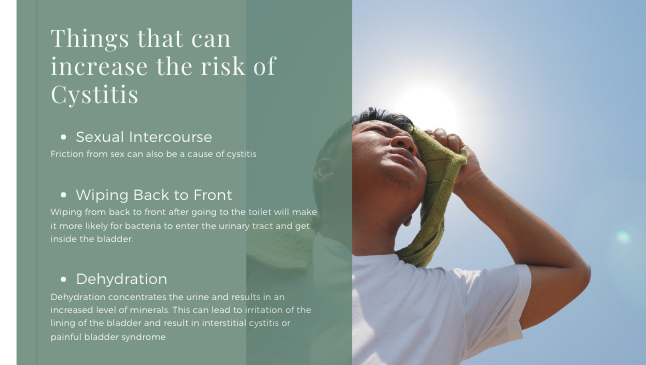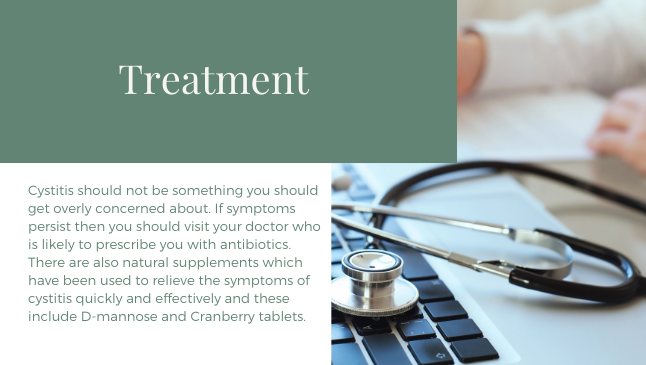D-mannose
A Guide to Cystitis: Symptoms, Causes, Prevention and Treatments
Cystitis, also known as a bladder infection, or water infection, is a common type of Urinary Tract Infection (UTI). The cause of cystitis is when bacteria from outside the body enters the urinary tract. The specific bacterium which causes most cystitis infections is Escherichia coli (E. Coli). More women than men suffer from this infection. Some people experience recurrent bouts of cystitis and therefore need to manage this on a regular basis. If you have cystitis, then it is likely you will experience some symptoms.
Although cystitis is not something to be overly concerned about and can sometimes go away naturally after a few days, if symptoms persist it is important that you seek treatment.
Symptoms of Cystitis
- A strong and persistent urge to urinate
- Burning sensation during urination
- Passing small amounts of urine on a frequent basis
- Blood in the urine, known as hematuria
- Strong-smelling, cloudy urine
- Discomfort in the pelvic area
- Pressure on the lower abdomen
- A low-grade fever
What can cause cystitis and how can you help to prevent it?
As we have already mentioned, cystitis infections are caused by bacteria entering the urinary tract. The bacteria will cause inflammation within the bladder, and you are likely to experience some of the symptoms mentioned above. There are things you can do to make it less likely for you to suffer from it. Some people will suffer from cystitis more regularly than others and will need to maintain this accordingly, often with a long-term treatment plan.

Why is cystitis more common in women?
Cystitis is more common in women because females have a shorter urethra, which is the thin, fibromuscular tube used to transport urine from the bladder to outside the body. The urethra in a female body is also positioned close to the anus which also makes cystitis more likely. Around 10% of women will get cystitis at least once a year, the percentage is a lot smaller in men.
What increases the risk of you getting cystitis?
We have established that cystitis is triggered by bacteria entering the urinary tract and causing an infection. It is not always apparent, however, how bacteria enter the urinary tract in the first place to cause an infection but there are certain things which can increase your risk, and these include:

Having Sex
This applies primarily to women, mainly because the female urethra is positioned close to the anus and therefore makes it possible for bacteria to enter the urinary tract during sex. Friction from sex can also be a cause of cystitis. To decrease the likelihood of an infection developing it is recommended that you urinate just before and then straight after sex as this can help to flush out the bacteria from your system. Having a glass of water after sexual intercourse is also seen as a way of minimising your chances of getting cystitis.
Wiping from Back to Front
Once again, this applies to women. Wiping from back to front after going to the toilet will make it more likely for bacteria to enter the urinary tract and get inside the bladder. It is therefore recommended that you wipe from front to back.
Dehydration
Dehydration concentrates the urine and results in an increased level of minerals. This can lead to irritation of the lining of the bladder and result in interstitial cystitis or painful bladder syndrome. Other typical symptoms include urgent and frequent urination and pelvic pain. Drinking plenty of water and staying hydrated will also help to flush bacteria from your bladder before it has an opportunity to develop into an infection.
Not being able to fully empty your bladder
Being unable to fully empty your bladder is one of the primary causes of cystitis. If you are unable to empty your bladder completely then bacteria which has managed to get inside the bladder may not be completely flushed away during urination. Bacteria which remain within the bladder can therefore multiply and cause an infection. There could be various reasons why you find it difficult to empty your bladder and these include, a blockage including a bladder stone, pregnancy and the baby pressing on your bladder and also an enlarged prostate in men which could press on the urethra.

Having a urinary catheter fitted
A urinary catheter is a thin tube which is inserted into the urethra to help drain the bladder. They are inserted when a person has difficulty peeing naturally. Urinary catheters have been viewed as the cause of UTI’s including cystitis. It is important that urinary catheters are inserted correctly and well maintained. Both long-term and short-term catheters can cause cystitis but obviously, the longer you have a catheter inserted the more likely it is to cause an infection.
Using a diaphragm for contraception
A contraceptive diaphragm or cap is used by women and inserted into the vagina before sex. This contraceptive method has been known to increase the likelihood of getting cystitis. It is also not recommended if you already suffer from UTI’s including cystitis on a regular basis.
Being Diabetic
The reason diabetes increases your risk of getting cystitis is because of the high levels of sugar within your body. High sugar levels within urine creates a suitable environment for the multiplication of bacteria and therefore makes it more likely for you to get cystitis.
Chemical Irritants
Some chemicals in soap or bubble bath can irritate the urethra which may lead to an infection. Sometimes it can just be a case of trying different products to establish which varieties cause little or no irritation.
Wearing synthetic and nylon underwear fabrics (women)
Certain types of underwear, particularly those made with synthetic or nylon fabrics, are prone to trapping bacteria within the vaginal area. Cotton underwear is the best choice if you are looking to prevent cystitis from occurring. Cotton is breathable and therefore provides fewer opportunities for bacteria to grow and thrive. Moisture-wicking cotton underwear is considered best as it takes moisture away from the body. Some women recommend not wearing underwear at all in bed at night as this will cause less irritation to the vaginal area.
Menopause
Women going through the menopause will have a lack of the hormone, oestrogen, and this can cause the lining of the urethra to shrink and become thinner. Another potential consequence of the menopause is that the natural balance of bacteria within the vagina may change. Both of these outcomes could cause the urethra to become infected as this could spread to the bladder.

Cystitis Treatment
Although it can be disruptive to your everyday life with its annoying symptoms, cystitis should not be something you should get overly concerned about. If symptoms persist then you should visit your doctor who is likely to prescribe you with antibiotics. There are also natural supplements which have been used to relieve the symptoms of cystitis quickly and effectively and these include D-mannose and Cranberry tablets.
How long does Cystitis last?
Mild cases may only last for a few days before going away naturally. In other instances, however, you may need to see a doctor and have some form of treatment. Antibiotics are usually prescribed by doctors for cystitis but there are also different types of natural treatments which are becoming increasingly popular. If your cystitis does not go away within the first few days, then it is important that you get treatment before it leads to something more serious like a kidney infection.
How long does cystitis last without being treated?
If you have mild symptoms, the infection may just go away naturally within a few days without any sort of treatment although many people take painkillers such as ibuprofen or paracetamol to relieve the discomfort. It is also recommended that you drink plenty of water to help to flush out the bacteria causing the infection. If symptoms persist for longer than a few days it is recommended that you seek advice from your doctor about possible treatment as cystitis, in rare cases, can develop into something more serious like a kidney infection.
How long does cystitis last with antibiotics?
A lot will depend on the severity of the cystitis, but antibiotics tend to get to work quickly in killing the bacteria which causes the bladder infection. Many people who have used antibiotics for cystitis have reported symptom relief within one and three days. Antibiotics, however, are not always suitable for prolonged use for cystitis as bacteria can form resistance to the antibiotics over time. This has led to many people who suffer from recurrent cystitis to look for natural alternatives to antibiotics in order to treat their symptoms.
Can you get rid of cystitis with natural supplements?
If you are looking for a natural alternative to antibiotics or natural supplements which can be used alongside antibiotics, there are plenty of options available. One of the most well-known natural supplements for bladder infections is d-mannose. This is a natural sugar which is a close relation to glucose. D-mannose is a monosaccharide isomer of glucose and is considered as a ‘simple sugar’ because it contains just one molecule of sugar. Our bodies do produce d-mannose in very small quantities, and it is also found in fruits and vegetables like apples, oranges, broccoli and green beans. Cranberry based supplements have also been used by women and men suffering from cystitis.

How does D-Mannose work?
There has been some research into how d-mannose works. Studies suggest that d-mannose attaches itself to bacteria to prevent it from latching on to cells, therefore stopping it from growing and causing infection. The d-mannose along with the bacteria is then eradicated from the bladder during urination.
D-Mannose supplements
There are different types of d-mannose supplements available to choose from. D-mannose powder has a sweet taste, and you can dissolve it in a glass of water before drinking. D-mannose tablets are another option, with certain varieties containing up to 1000mg of D-mannose. Recommended dosage varies as some people take d-mannose supplements even when they do not have cystitis as they believe it helps to prevent UTI’s from occurring in the first place.
D-mannose for recurrent cystitis
Because d-mannose is 100% natural it is suitable for long-term maintenance and is therefore often chosen by those who suffer from recurrent cystitis as an alternative to antibiotics. For those looking to acquire d-mannose for prevention and maintenance purposes, you can buy d-mannose in the UK from naturesupplies.co.uk at affordable prices.
Cranberry supplements
Cranberry has long been considered as a potential natural treatment for cystitis. Research actually suggests that cranberry supplements, in the form of tablets and capsules, are more effective than cranberry juice as the acidity within the juice may actually irritate the bladder. Cranberries are actually a natural source of d-mannose which explains the use of them for UTI’s and cystitis.
Interstitial Cystitis
A lot is still unknown about interstitial cystitis. It is often shortened to IC or referred to as painful bladder syndrome or bladder pain syndrome. It is a condition which tends to affect people in their 30s and 40s and is more prevalent in women than it is in men.
Dr Helen O’Connell, a consultant urologist at the Royal Melbourne Hospital, said this about interstitial cystitis: “It’s a non-malignant, non-infective condition which may be associated with changes that are apparent when you look at the bladder, but sometimes the bladder may appear normal, [although] the patient may be crippled with discomfort.”

Symptoms of Interstitial Cystitis
Symptoms can include intense pain in the pelvic area, below your bellybutton. Also, strong urges to pee suddenly, needing to pee regularly and waking up on several occasions each night to go to the toilet are other symptoms of interstitial cystitis.
Causes of Interstitial Cystitis
Causes of interstitial cystitis can include damage to the lining of the bladder which may result in urine irritating the surrounding muscles and nerves. It may also be caused if you have issues with your pelvic floor muscles. In addition to this, it can be brought on by an allergic reaction and if your immune system begins to mistakenly attack your bladder. Interstitial Cystitis may be triggered by stress, smoking, certain foods and the amount you drink.
Prevention and Treatments for Interstitial Cystitis
By controlling these factors, you may be able to prevent or reduce the symptoms of interstitial cystitis. In many cases, it will require some form of treatment. If you are diagnosed by your doctor then they may recommend the following medicines:
- Over the counter painkillers such as ibuprofen or paracetamol
- Antihistamines including loratadine and cetirizine
- Stronger painkillers on prescription like amitriptyline, gabapentin and pregabalin
- Medicines which help to relax the bladder such as tolterodine, solifenacin or mirabegron
- A medicine which may help to repair the bladder lining called pentosan polysulfate sodium (Elmiron)

References
https://www.mayoclinic.org/diseases-conditions/cystitis/symptoms-causes/syc-20371306
https://www.nhs.uk/conditions/cystitis/causes/
https://www.avogel.co.uk/health/cystitis/prevention/12-natural-ways-to-prevent-cystitis/
